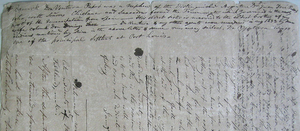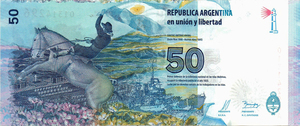RIVERO, ANTONIO
c 1807 - 1845? from Argentina
Argentine gaucho and murderer, thought by some authorities to have been born in the Province of Entre Ríos, was an illiterate gaucho, a peón employed by Louis VERNET to work at his colony at Port Louis.
According to the list of the inhabitants made by Captain JJ ONSLOW, of HMS Clio, on 10 January 1833 at Port Louis, Rivero at that point was 26 years old, born in Buenos Aires and had arrived in the Falkland Islands two years previously.
In one of his reports Onslow noted: 'I regretted to observe a bad spirit among the gauchos; they appeared dissatisfied with their wages'. Indeed Captain Matthew BRISBANE, who had been appointed by Vernet to superintend his property, was paying the gauchos, not in currency, but in the pesos notes printed by Vernet, which William DICKSON, the storekeeper, was reluctant to accept.
Disgruntled, Rivero led an uprising against Brisbane on 26 August 1833. He gathered two other Argentine farm labourers and five Indians; their attack was swift and unexpected. Brisbane and four others were murdered (William Dickson, Juan SIMÓN, Antony Wagner (trader) and Don Ventura Pasos). Their houses were ransacked and the contents destroyed. The remaining inhabitants fled Port Louis.
Over the six months that followed, the murderers lived at large in the Camp and the survivors, fearing for their lives, on islands in Berkeley Sound. Early in March 1834, Rivero and his band were tracked by a posse of marines and loyal gauchos. On about 3 March, Rivero, in the words of Lieut Henry SMITH's report: '... determined the following morning to betray his companions, and deliver the horses (fifty three), being his turn then to take care of them, which he accordingly did...' The murderers were brought back as prisoners to Port Louis. The eight miscreants were shipped to Río de Janeiro and held prisoner there for 12 months, awaiting a suitable occasion to transport them to England for trial. They arrived at Sheerness on board HMS Snake in May 1835.
Legal problems then arose as to whether the six remaining prisoners, none of whom was a British-born subject, could be tried and punished under British law for murder committed in a British overseas possession. As a result of the lack of clear definition in the legality of the case, the British legal authorities decided not to put them on trial. Accordingly, the four surviving prisoners were repatriated to South America. Rivero was released in Montevideo.
Rivero, it is claimed by some authors, died in the naval battle of Vuelta de Obligado on the Paraná River, which took place on 20 November 1845 between Argentina and Anglo-French forces.
Antonio Rivero became a national obsession under President Juan PERÓN. He was hailed as a patriotic rebel against the 'usurping' British and became the object of a minor cult. However, some Argentine authors have since debunked this interpretation of history. None the less, during the occupation of the Falkland Islands in 1982, Port Stanley was briefly renamed Puerto Rivero in his honour, until it was realised that he was a less than suitable role model.
References
Richard Ware. "The Case of Antonio Rivero and Sovereignty over the Falkland Islands," The Historical Journal (1984) 27#4 pp. 961–967
Comments
Revisions
December 2019 One photograph added; one reference added
March 2020 One additional photograph added

